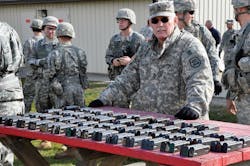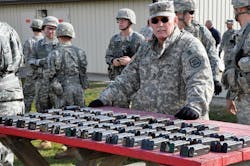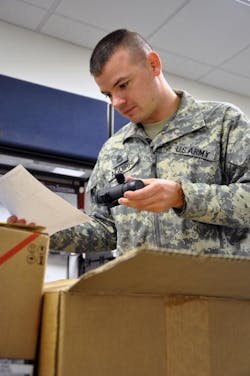A recent Iowa National Guard profile of two senior supply sergeants began with these immortal words, which, frankly, many in trucking can relate to: logistics is not for the faint of heart.
So true, so true.
Sgt. 1st Class Harold Tackett, 51, Senior Supply Sergeant out of Runnells, IA, and Sgt. 1st Class Daniel Aguirre, 33, Supply Sergeant, from nearby Altoona, manage day-to-day logistical support for the Iowa National Guard’s Joint Forces Headquarters (JFHQ); responsible for the needs of some 300 soldiers (54% of whom are officers) and $21 million worth of equipment and supplies at Camp Dodge in Johnston, IA.
Recently, they were presented the regional Chief of Staff, Army, Supply Excellence Award (SEA), which recognizes supply excellence at the organizational level. Basically, these two troopers represent some of the best of the bestAccording to Sgt. Tackett (seen at right, issuing ammunition) – a 22-year Iowa National Guard member, originally from Ohio, who also spent 11 years on active duty with the U.S. Army proper – if there’s any one key to running a successful supply operation, it would have to be organization.
“To be successful, you have to be well organized,” he recently explained. “You have to be really, really, organized in supply [because] if you’re not organized, you’ll have nothing but chaos. You simply have to pay attention to detail on a daily basis.”
While Sgt. Tackett believes his success in logistics stems from “simply doing our job” by adhering to the standards set forth in U.S. Army and National Guard regulations, he also feels a lot of experience and knowledge gets lost in the transition from one generation of soldiers to the next – again, a feeling many in trucking, I am sure, share.
“There are too many young supply sergeants today, who have been suddenly thrust into new jobs and left to fend for themselves. They need to have mentoring sessions,” Sgt. Tackett stressed. “You have to mentor junior logisticians on how to do their job and how to do it proficiently. Once you get the basics down, it’s easy.”
That’s someAguirre (seen at left) joined the Iowa National Guard in 2001, during his senior year at Ankeny High School. He originally served as a supply technician with the 186th Military Police and then became a supply sergeant for the 671st Troop Command (the JFHQ supply team’s unit).
“Sgt. Tackett knows everything there is to know about supply,” Sgt. Aquirre said. “Anything I can learn from him definitely helps me. He mentors me, he gives me advice [and] he answers any and all of my questions."
For them, there is no such thing as a “typical work day.” For example, they may have to support a “Command Retreat” one day, prepare weapons and ammunition for the qualification range the next, while getting ready for the Iowa State Fair Military Day parade.
In fact, Sgt. Tackett believes the “easiest part of the day” is coming to work. “It’s what happens when you get here” that is the toughest part, he explained.
The reason Sgt. Tackett and Sgt. Aquirre’s tale is important to trucking is that they represent a skill set that is rapidly vanishing from America’s workforce – a skill set that joins many others in increasingly being looked down upon in our nation.
John Larkin, managing director and head of transportation capital markets research at Stifel Financial Corp., took note of this disturbing view of labor as part of a recent outlook note examining the opportunities and challenges ahead for the U.S. logistics industry.
“The U.S. has allowed its society to become bifurcated into the ‘haves’ and the ‘have nots’ with the broad perception seeming to be that one either goes to college and becomes a doctor, lawyer, investment banker, accountant, business owner, etc., or he/she is a failure – doomed to be perpetually dependent on our country’s welfare support structure,” he said.“Somewhere along the way, it became unfashionable to be a tradesman,” Larkin added.
“Carpenters, electricians, plumbers, computerized machine tool programmers, airplane mechanics, diesel mechanics, truck drivers, heavy equipment operators, et. al., are often thought, by many, to be second class citizens,” he noted.
As a result, Larkin (at right) said that “too few” non-college educated people seriously consider those and other relatively lucrative yet “blue collar” careers.
“The surplus of college graduates we have created by continually suggesting that a college education is the only route available to lead individuals to a ‘successful’ career considers itself generally overqualified for the blue collar oriented jobs that are currently available in the millions throughout in the U.S. – jobs available in spite of the disappointing rate of economic growth that has plagued our country since the Great Recession,” he added.
That’s something to think long and hard about as the logistics business is definitely going to need lots of savvy and skilled hands such as those belonging to Sgt. Tackett and Sgt. Aquirre in the years ahead.



